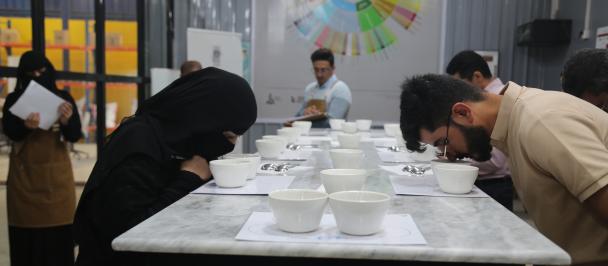Bibi Afghani lives in Nangahar province, eastern Afghanistan. She has six sons and two daughters. Her family has been beset by bad luck in the last few years.
A Tale of Two Women
December 5, 2022

Bibi Afghani selling an item to a woman
Bibi Afghani lives in Nangahar province, eastern Afghanistan. She has six sons and two daughters. Her family has been beset by bad luck in the last few years.
A few years ago, her husband, Dawood, was serving as a driver in a medical faculty. One day, the medical faculty was attacked by terrorists, and Dawood was shot, twice. He was lucky to survive, but the bullet damaged his hip, and he still needs treatment. After 15 August 2021, when the Taliban ousted the government, Dawood was dismissed from his job with no pension, and few prospects for employment as he could not do heavy manual work anymore. So Bibi started to work. She started up a shop in their home. They had to stop sending their two sons to school; the whole family had to work, selling plastic bags to make ends meet.
Rabia is another woman living in Surkhroad district of Nangarhar province in Eastern Afghanistan whose husband cannot work, leaving Rabia to earn enough money for the family. They have nine children, two of them with special needs. Rabia had started work as a seamstress. She had skills in both tailoring and embroidery, but due to the weak economy, she couldn’t afford the machinery and other necessary materials to help her business grow. She earned just 4-5 thousand AFG a month (about US50$).
ABADEI is UNDP’s flagship development programme for Afghanistan. As one component of the programme, small and medium-sized businesses led by women are supported with grants and business advice given through NGOs on the ground like the Danish Refugee Council. Bibi Afghani and Rabia were both identified by ABADEI as eligible candidates.
ABADEI paid a total of 90,000 Afs (around $1,000) to Rabia, in two installments. With this money, she bought a sewing machine, a small solar power array for her workplace, and other accessories. Rabia says that since receiving the grant, she has received many more orders from local people and businesses for items like clothes and bedsheets. She has also created permanent jobs for five other girls, including her daughter. She says that her life changed completely after the grant. “I am so happy to find such a golden opportunity in my life. With the help of ABADEI, I can face my relatives proudly.”
Bibi Afghani also received a grant of 75,000 Afs ($800-900) in two installments. She used the money to purchase a great deal of stock for her shop; now, it stocks everything you would expect to find in a small grocery store and is popular with villagers. Both Bibi’s children are now back in school, and now she earns enough to look after her family.
“Our lives had become difficult because of poverty,” says Bibi. “I pray for everybody who supported us.”
This project was realized through a generous donation from the Government of Japan, a long-term partner to UNDP Afghanistan that continued through the COVID-19 pandemic and the sudden changes in August 2021.
UNDP Afghanistan and The Government of Japan share the vision of the centrality of Human Security and the Humanitarian-Development-Peace Nexus approach in responding to, and recovering from, the crisis in Afghanistan.

 Locations
Locations


